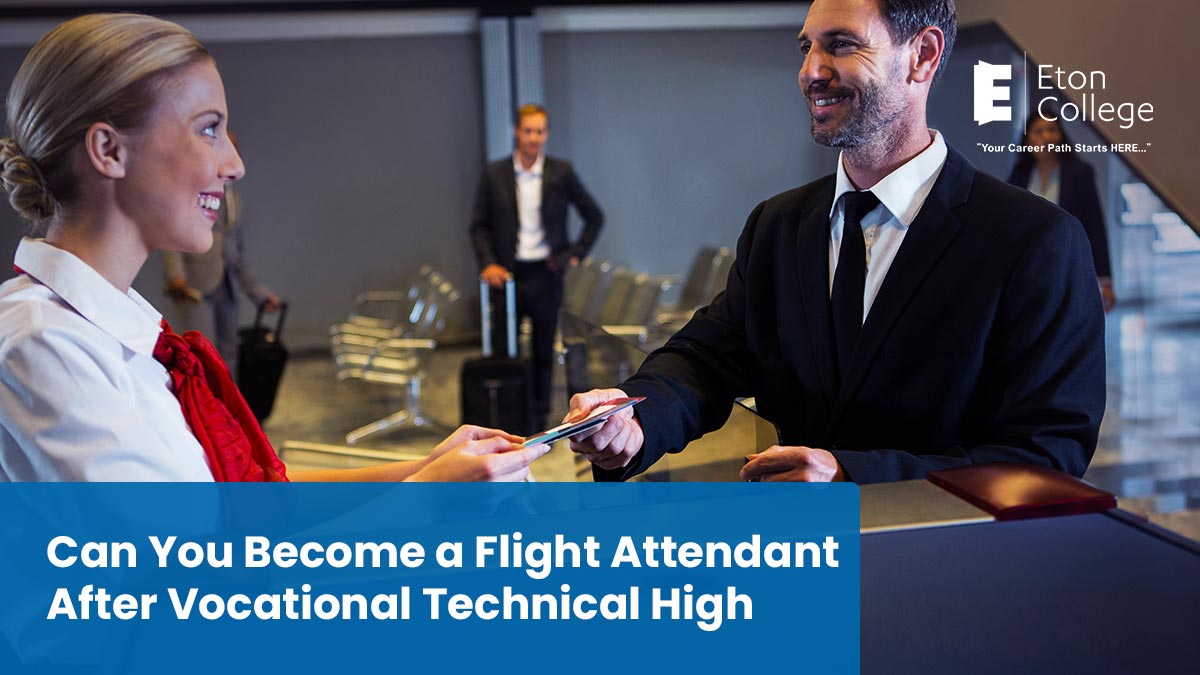- Graduating from vocational or technical high school meets the basic educational requirement for most airlines.
- Practical skills learned in vocational programs align well with flight attendant responsibilities.
- Eton College’s 14-week Flight Attendant Preparation Program provides in-depth training, hands-on experience, and certifications that give graduates a competitive edge.
Dreaming of a career that lets you travel the world, interact with diverse people, and experience new cultures? Becoming a flight attendant might be the perfect fit for you. One common question among vocational and technical high school graduates is whether they can pursue this exciting career after completing their studies. The answer is yes! While some airlines may prefer candidates with a college degree, many vocational technical high school graduates can still enter this exciting profession, provided they meet specific requirements and complete the necessary training.
Basic Qualifications to Become a Cabin Crew Member
Regardless of educational background, there are several essential requirements to becoming a flight attendant:
- Minimum Education: Airlines generally require a high school diploma or equivalent. Vocational technical high school graduates meet this requirement.
- Age Requirements: Most airlines require candidates to be at least 18 or 21 years old, depending on the specific airline policy. This fits well with the timeline of vocational high school graduates.
- Physical Fitness: Flight attendants need to meet physical requirements such as height and fitness levels to ensure they can assist passengers in emergency situations and perform physically demanding tasks.
- Communication Skills: Fluency in English is typically required, as it is the standard language in the aviation industry. Additional language skills are a bonus, especially when applying to international airlines.
- Soft Skills: Airlines look for candidates with strong customer service skills, teamwork abilities, and the capacity to stay calm under pressure. These are traits that can be developed through both life experiences and targeted training.
Why Vocational Technical Graduates Are Suitable for Cabin Crew Roles
Many vocational technical high school graduates have skills that are highly relevant to cabin crew positions. Vocational education often includes practical, hands-on learning that builds problem-solving skills, adaptability, and customer service experience—qualities that are crucial for flight attendants. For example, vocational schools offering courses in hospitality, tourism, or customer service provide a strong foundation for students interested in working as a flight attendant.
Moreover, the practical skills gained in vocational programs can help students excel in emergency preparedness, safety training, and service excellence—all critical aspects of a flight attendant’s role.
Importance of a Flight Attendant Course
Though a vocational high school diploma meets the minimum educational requirement, completing a flight attendant course is essential for vocational graduates to stand out in the job market.
Flight attendant courses typically include:
- Safety and Emergency Procedures: A major part of the flight attendant role is ensuring the safety of passengers. Training focuses on handling in-flight emergencies, such as medical incidents, turbulence, and emergency evacuations.
- First Aid Certification: Many flight attendant courses offer First Aid and CPR certification, which is a vital component of the training. Being prepared to assist passengers in medical emergencies is a key requirement for flight attendants.
- Customer Service Excellence: Flight attendants must deliver exceptional service, handling passenger needs while maintaining a pleasant environment. A flight attendant course often emphasizes customer relations, conflict resolution, and the ability to handle difficult situations calmly and professionally.
- Communication Skills: Effective communication is essential when working with both passengers and the flight crew. Flight attendants must be able to provide clear instructions, make announcements, and manage interactions with the cockpit crew during critical situations.
- In-Flight Duties: Training includes practical tasks such as managing in-flight service, ensuring cabin cleanliness, and assisting passengers with requests. A flight attendant course provides hands-on practice in performing these duties efficiently.
By completing a flight attendant course, vocational graduates demonstrate that they have received industry-specific training and are prepared for the realities of the job. This training makes candidates more appealing to airlines, as they require less on-the-job instruction and are ready to handle responsibilities from day one.
How Eton College Can Help You Succeed
For vocational graduates looking to complete a flight attendant course, Eton College offers one of the most comprehensive training programs available: the Flight Attendant Preparation Program (FAPP). This 14-week program is specifically designed to equip aspiring flight attendants with the skills, certifications, and experience necessary to thrive in the aviation industry.
Eton’s Flight Attendant Preparation Program covers:
- Safety Procedures and Emergency Management: In-depth training on handling in-flight emergencies, managing cabin operations, and ensuring passenger safety.
- First Aid and CPR/AED Certification: Eton College includes critical medical certifications, ensuring that students are prepared to respond to medical emergencies during flights.
- Customer Service and In-Flight Operations: Hands-on training in providing top-notch in-flight service, managing passenger needs, and maintaining a high level of professionalism.
- Real-World Experience: The program offers opportunities for students to visit Vancouver International Airport (YVR), where they observe and gain valuable insights into real airline operations, giving them a competitive edge in the job market.
Vocational Graduates Can Become Flight Attendants
Vocational technical high school graduates have all the potential to become successful flight attendants, especially when they enhance their qualifications with a specialized flight attendant course. Completing a course from a reputable institution like Eton College ensures that you gain the necessary skills, certifications, and hands-on experience to excel in the aviation industry.




